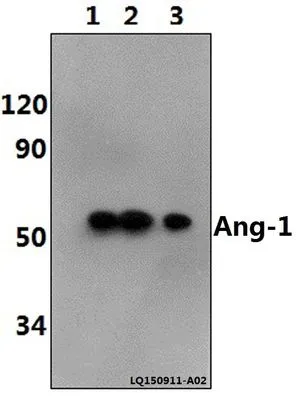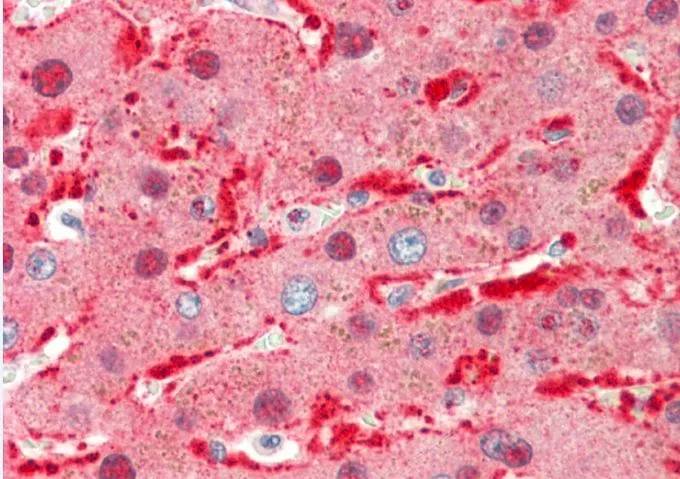
WB analysis of various samples using GTX66700 Angiopoietin 1 antibody. Lane1 : PC12 whole cell lysate(40ug) Lane2 : NIH-3T3 whole cell lysate(40ug) Lane3 : Hela whole cell lysate(40ug) Dilution : 1:500
Angiopoietin 1 antibody
GTX66700
ApplicationsWestern Blot, ImmunoHistoChemistry, ImmunoHistoChemistry Paraffin
Product group Antibodies
ReactivityHuman, Mouse, Rat
TargetANGPT1
Overview
- SupplierGeneTex
- Product NameAngiopoietin 1 antibody
- Delivery Days Customer9
- Application Supplier NoteWB: 1:500-1:1000. IHC-P: 1:50-1:200. *Optimal dilutions/concentrations should be determined by the researcher.Not tested in other applications.
- ApplicationsWestern Blot, ImmunoHistoChemistry, ImmunoHistoChemistry Paraffin
- CertificationResearch Use Only
- ClonalityPolyclonal
- Concentration1 mg/ml
- ConjugateUnconjugated
- Gene ID284
- Target nameANGPT1
- Target descriptionangiopoietin 1
- Target synonymsAGP1, AGPT, AGPT-1, ANG1, HAE5, angiopoietin-1, ANG-1
- HostRabbit
- IsotypeIgG
- Protein IDQ15389
- Protein NameAngiopoietin-1
- Scientific DescriptionThis gene encodes a secreted glycoprotein that belongs to the angiopoietin family. Members of this family play important roles in vascular development and angiogenesis. All angiopoietins bind with similar affinity to an endothelial cell-specific tyrosine-protein kinase receptor. The protein encoded by this gene is a secreted glycoprotein that activates the receptor by inducing its tyrosine phosphorylation. It plays a critical role in mediating reciprocal interactions between the endothelium and surrounding matrix and mesenchyme and inhibits endothelial permeability. The protein also contributes to blood vessel maturation and stability, and may be involved in early development of the heart. Alternative splicing results in multiple transcript variants encoding distinct isoforms. [provided by RefSeq, Sep 2015]
- ReactivityHuman, Mouse, Rat
- Storage Instruction-20°C or -80°C,2°C to 8°C
- UNSPSC41116161






![IHC-P analysis of formalin fixed human placenta tissue using GTX52472 Angiopoietin 1 antibody [26B10].](https://www.genetex.com/upload/website/prouct_img/normal/GTX52472/GTX52472_20191119_IHC-P_w_23060900_751.webp)

